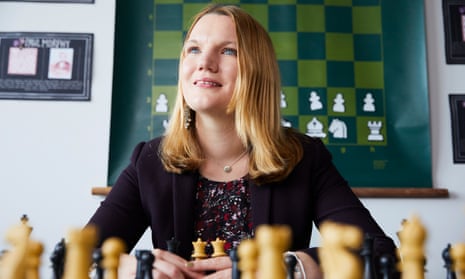For Jovanka Houska, chess professional and Britain’s reigning women’s champion, the emotion reflected in the new Nexflix drama The Queen’s Gambit perfectly captures the international world of the game.
Houska, 40, an international master, female grandmaster, nine-times winner of the British Women’s Chess Championship, and who was a child prodigy growing up in south London, believes “the emotion of how a player feels has been done brilliantly”, those moments “when someone outclasses you, and you really feel the pain.” She adds the settings chime too, “from the most glamorous location in one tournament to a school gymnasium in another”.
The series, which launched in October, follows the story of a young orphan named Beth who becomes a top chess player. Named after one of the oldest chess openings, and adapted from the 1983 novel by Walter Tevis, The Queen’s Gambit follows Beth from age eight to 22, and her battle not just to gain acceptance in a male-dominated world, but also against her psychological demons and drug addiction.
Former world champion Garry Kasparov was a consultant, so it’s no surprise that elite players have found few if any flaws in the depiction of their cherished game on screen.
But it is Beth’s experience of being one of the very few women in the room that Houska can really relate too. Sexism can be rife, not at higher levels where players respect each other, she said, but at “hobby” level where you can encounter some “socially awkward players who don’t know how to handle themselves around a woman”.
And most definitely when you are a child, she said, where boys are overconfident “and that’s a benefit in chess. They talk over the girls. They are very happy to say ‘well, you’re just a girl’. I had a lot of comments like that growing up.”
Dramatic elements aside, the chess world hopes it will ignite interest in the game from more girls. Houska, whose own chess novel The Mating Games has been optioned by a Hollywood company, hopes that will be its greatest legacy.

As does Sarah Longson, 32, a former child prodigy, former British women’s champion and a Fide (International Chess Federation) master. “It’s great for girls, and it’s great for chess”, said Longson who runs the UK Schools Chess Challenge, which she won herself aged seven, landing a slot on Blue Peter with her idol, Kasparov.
“I looked up to Kasparov. I followed his games. So, it was so exciting to see that books were so important to Beth. That’s the way I grew up. That’s how you develop a passion,” said Longson, who believes studying past master games is crucial to learning and success.
If she has one tiny criticism, it is that Beth is a winner from the start. “You have to lose, and learn from your losses to get better. That is where you develop resilience and loads of life skills.” The series portrayal of the atmosphere of tournaments with “everyone crowding around, all helping each other,” was spot on though, Longson said.
Chess aficionados have had fun on the internet working out the moves portrayed in the series and sourcing them. “It’s like, ‘Did you see Reti v Tartakower, Vienna, 1910?’ ‘Yes, of course, how dare you suggest I did not,’,” said Malcolm Pein, an international master who runs the charity Chess in Schools and Communities, getting the game into classrooms and aimed at attracting more female pupils.
As a six-year-old, he played games in his head in bed, “seeing the pieces in the bedroom window”. He related totally to the scene where Beth, lying in her orphanage bed, sees chess pieces on her ceiling.
Pein has heard anecdotal evidence of an increase in interest for chess lessons since the series aired. His chess shop in central London had also seen an uptick in orders for basic chess board sets. Meanwhile, eBay has reported a 276% increase in searches for chess sets after the show’s release.
Beth learning Russian to improve her game also resonated. At school Pein learned enough Russian to read chess books and magazines with details of all the latest tournaments. He said that as a teenager, he would travel from Liverpool to London to what they “jokingly called ‘the communist shop’ because it sold leftwing literature”. There he would stock up.
The unglamorous venues for tournaments portrayed in the series were all too real. At one, “the equivalent of the FA Cup quarter final”, Pein remembered sitting in a classroom on primary school pupil-sized chairs. Great players have often suffered “lousy” conditions, he said. “It’s like the London Philharmonic playing in sheds, that’s how impoverished the game has been at times.”
“The greatest takeaway from this is young girls taking an interest. I hope it makes parents realise chess is a hobby for their daughters, not just their sons,” Pein said.
“It is just saying to girls, you can play chess, you can be great. You can thrive. And what we need to achieve now is critical mass in female participation.”
